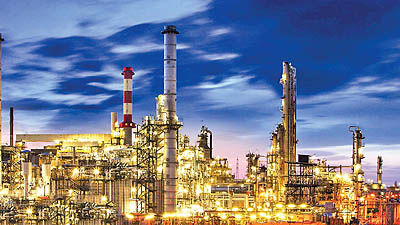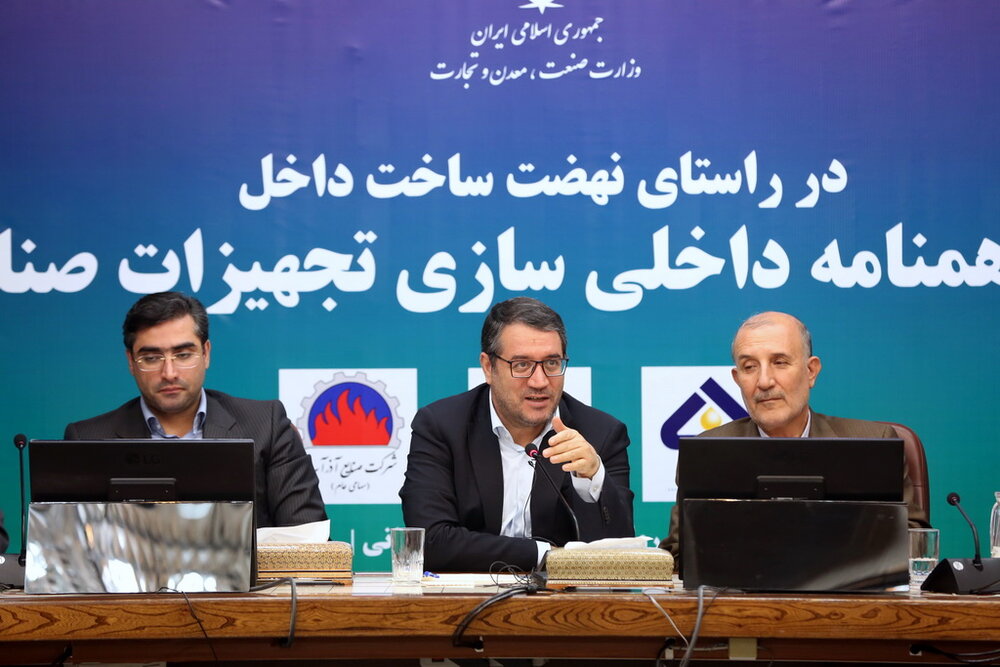
Iranian companies sign €60m petchem equipment production agreement


The signing ceremony was participated by Industry, Mining and Trade Minister Reza Rahmani on Tuesday, IRIB reported.
Based on the agreement worth €60 million, the manufactured equipment will be supplied to Kian Petrochemical Company (in the southwestern province of Bushehr) and Dehloran Petrochemical Industries (in the western province of Ilam).
During the signing ceremony, Mehdi Sadeqi Niaraki, the deputy minister of industry, mining and trade, said that 18 petrochemical projects worth €60 billion are currently underway in Iran that 60 percent of their required equipment can be manufactured inside the country.
He said that 3,500 equipment and machinery manufacturing units are active in the country and over 2,000 industrial equipment and machinery have been already listed to be indigenized.
The official also announced that contracts worth €107 million have been recently signed for manufacturing equipment applied in the auto industry.
The current Iranian calendar year of 1398 (began on March 21) is named as the year of "Pickup in Production" by Leader of the Islamic Revolution Ayatollah Seyed Ali Khamenei.
The realization of this motto toward Iran’s self-reliance is in fact the only way to tackle the U.S. cruel sanctions on Iran’s economy.
To this end, Iranian government has put supporting domestic producers a top agenda in the current year.
Providing the required working capital for the production units and offering them facilities is one of the major measures being pursued by the government to support these units.
Abdolnaser Hemmati, the governor of the Central Bank of Iran (CBI), has specified providing of working capital for the production units as the major priority of the Iranian banks in the current year.
And industry minister has said that improving the efficiency of important factors in production and creating a movement for promoting domestic production are among the plans which the industry ministry is following to realize a sustainable domestic production.
They also expressed their concerns about the predictions made by the international economic institutions about high inflation and economic recession in Iran and also the low rank of the country in competitiveness.
Hojjati for his part referred to some statistics about increase in production and investment in the agriculture sector and also in water management throughout the country.
He also expressed his disagreement about some export bans and said, “We are dissatisfied with some bans.”
Addressing the same meeting, TCCIMA Head Masoud Khansari mentioned inflation, low value of national currency, government’s high expenditures, banks’ limited ability for granting facilities, unemployment and poverty as the major challenges that the national economy is predicting.


Trump weighs using $2 billion in CHIPS Act funding for critical minerals

Codelco cuts 2025 copper forecast after El Teniente mine collapse

Electra converts debt, launches $30M raise to jumpstart stalled cobalt refinery

Barrick’s Reko Diq in line for $410M ADB backing

Abcourt readies Sleeping Giant mill to pour first gold since 2014

Nevada army depot to serve as base for first US strategic minerals stockpile

SQM boosts lithium supply plans as prices flick higher

Viridis unveils 200Mt initial reserve for Brazil rare earth project

Tailings could meet much of US critical mineral demand – study

Kyrgyzstan kicks off underground gold mining at Kumtor

Kyrgyzstan kicks off underground gold mining at Kumtor

KoBold Metals granted lithium exploration rights in Congo

Freeport Indonesia to wrap up Gresik plant repairs by early September

Energy Fuels soars on Vulcan Elements partnership

Northern Dynasty sticks to proposal in battle to lift Pebble mine veto

Giustra-backed mining firm teams up with informal miners in Colombia

Critical Metals signs agreement to supply rare earth to US government-funded facility

China extends rare earth controls to imported material

Galan Lithium proceeds with $13M financing for Argentina project

Kyrgyzstan kicks off underground gold mining at Kumtor

Freeport Indonesia to wrap up Gresik plant repairs by early September

Energy Fuels soars on Vulcan Elements partnership

Northern Dynasty sticks to proposal in battle to lift Pebble mine veto

Giustra-backed mining firm teams up with informal miners in Colombia

Critical Metals signs agreement to supply rare earth to US government-funded facility

China extends rare earth controls to imported material

Galan Lithium proceeds with $13M financing for Argentina project

Silver price touches $39 as market weighs rate cut outlook

















